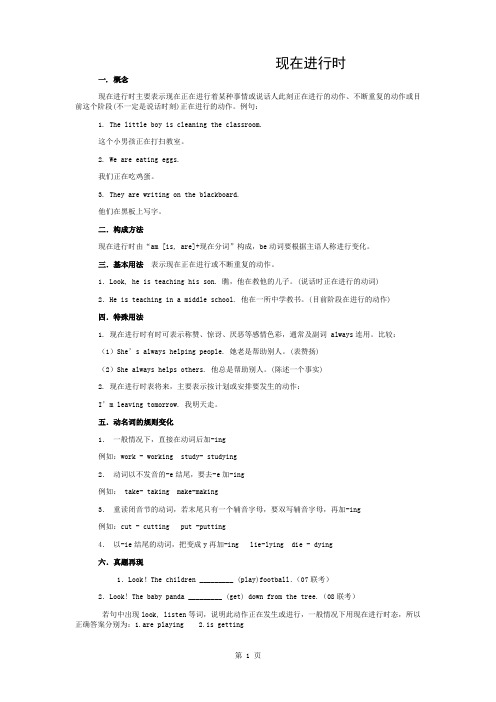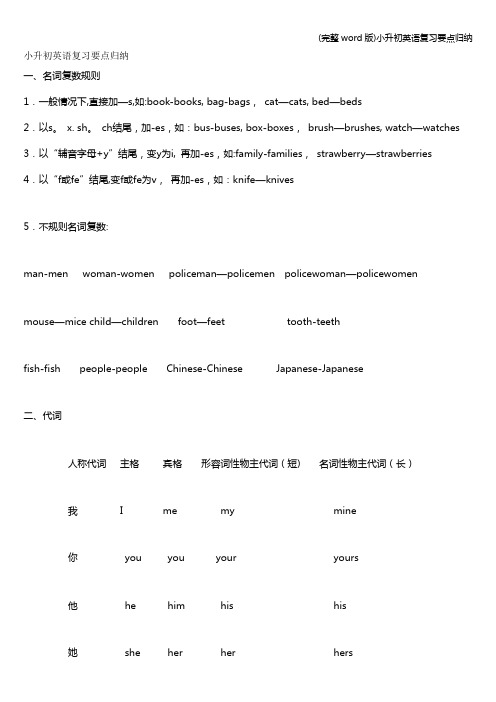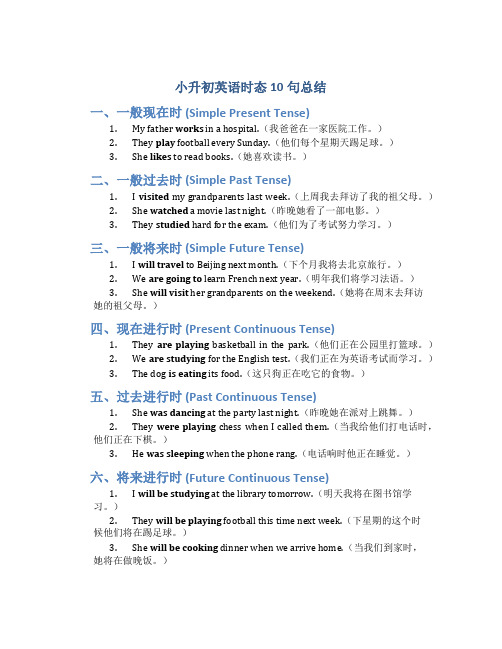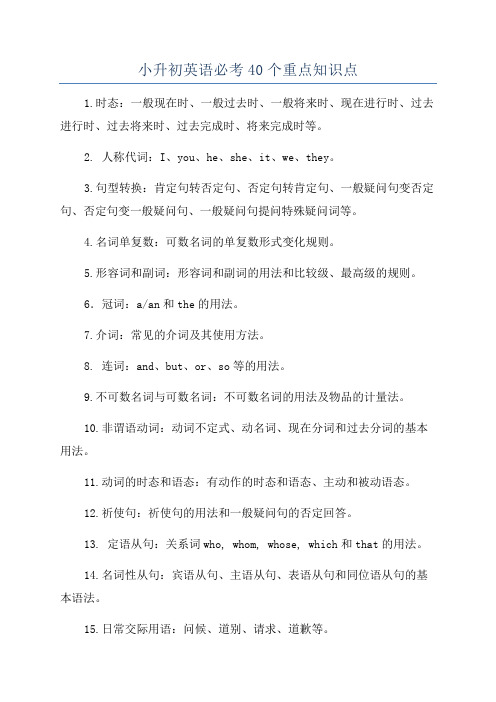【小升初】2020小升初英语复习:时态-一般将来时3
小升初英语时态专项复习及答案(教案)

现在进行时一. 概念现在进行时主要表示现在正在进行着某种事情或说话人此刻正在进行的动作、不断重复的动作或目前这个阶段(不一定是说话时刻)正在进行的动作。
例句:1. The little boy is cleaning the classroom.这个小男孩正在打扫教室。
2. We are eating eggs.我们正在吃鸡蛋。
3. They are writing on the blackboard.他们在黑板上写字。
二.构成方法现在进行时由“am [is, are]+现在分词”构成,be动词要根据主语人称进行变化。
三.基本用法表示现在正在进行或不断重复的动作。
1.Look, he is teaching his son. 瞧,他在教他的儿子。
(说话时正在进行的动词)2.He is teaching in a middle school. 他在一所中学教书。
(目前阶段在进行的动作)四.特殊用法1. 现在进行时有时可表示称赞、惊讶、厌恶等感情色彩,通常及副词 always连用。
比较:(1)She’s always helping people. 她老是帮助别人。
(表赞扬)(2)She always helps others. 他总是帮助别人。
(陈述一个事实)2. 现在进行时表将来,主要表示按计划或安排要发生的动作:I’m leaving tomorrow. 我明天走。
五.动名词的规则变化1.一般情况下,直接在动词后加-ing例如:work - working study- studying2.动词以不发音的-e结尾,要去-e加-ing例如: take- taking make-making3.重读闭音节的动词,若末尾只有一个辅音字母,要双写辅音字母,再加-ing例如:cut - cutting put -putting4.以-ie结尾的动词,把变成y再加-ing lie-lying die - dying六.真题再现1.Look!The children _________ (play)football.(07联考)2.Look! The baby panda _________ (get) down from the tree.(08联考)若句中出现look, listen等词,说明此动作正在发生或进行,一般情况下用现在进行时态,所以正确答案分别为:1.are playing 2.is getting3.---Who are you _________, Andy ---Mum. (10联考)A. waitB. waitingC. waiting forD. wait for根据现在进行时的构成可排除A和 D选项,本题考查wait for+等候的对象这一用法,故选C.精点精练一、用动词的正确形式填空。
(完整)小升初英语一般将来时

一般将来时1、定义:一般将来时表示将来某个时间要发生的动作或存在的状态2、结构:主语+will\shall\be going to+v(动词原形)+其他例如:It is going to rain. 要下雨了。
We are going to have a meeting today. 今天我们准备开一个会。
Tomorrow will be Sunday. 明天就是星期天。
The rain will stop soon. 雨很快就要停了。
I shall not go. 我不准备去了。
What shall we do for summer holiday?暑假我们做什么呢?注意:a.will用于所有人称,shall用于第一人称(we.I)b. will 常简略为'll,并与主语连写在一起,如:I'll,he'll,it'll,we'll,you'll,they'll。
c. 一般疑问句如用will you…?其简略答语须是Yes,I will 或No,I won't;3、时间标志:常常和表示将来的时间状语连用。
如:tomorrow(明天),next week(下周),from now no(从现在开始),in the future(将来),soon, in 2015, in two days(两天之后)等。
四种句式:1. be going to +动词原形1.肯定句主语+be(am /,is,/ are) going to +动词原形+其它My sister is going to learn English n ext year. 我姐姐准备明年学英语。
2.否定句主语+be(am / is / are)not going to +动词原形+其它I am not going to(go to)the cinema tonight. 我今天晚上不打算去看电影。
(完整word版)小升初英语复习要点归纳

小升初英语复习要点归纳一、名词复数规则1.一般情况下,直接加—s,如:book-books, bag-bags,cat—cats, bed—beds2.以s。
x. sh。
ch结尾,加-es,如:bus-buses, box-boxes,brush—brushes, watch—watches 3.以“辅音字母+y”结尾,变y为i, 再加-es,如:family-families,strawberry—strawberries 4.以“f或fe”结尾,变f或fe为v,再加-es,如:knife—knives5.不规则名词复数:man-men woman-women policeman—policemen policewoman—policewomenmouse—mice child—children foot—feet tooth-teethfish-fish people-people Chinese-Chinese Japanese-Japanese二、代词人称代词主格宾格形容词性物主代词(短) 名词性物主代词(长)我I me my mine你you you your yours他he him his his我们we us our ours你们you you your yours他们they them their theirs 口诀:主格应该作主语,放在句子的开头;宾格应该作宾语,放在动词介词后;形容词性的物主代词不能单独用,必须接名词或其他词;名词性的物主代词,单独使用就可以。
如:I am a student.What is your name?His bag is on the desk. That one is not his.Let me help you.These shoes are nice。
Try them on.They are drinking tea。
三、动词1。
be动词:am is are2. 普通动词:have go come take get buy passsit stand have talk walk see catch put等。
小升初英语时态10句总结

小升初英语时态10句总结一、一般现在时 (Simple Present Tense)1.My father works in a hospital.(我爸爸在一家医院工作。
)2.They play football every Sunday.(他们每个星期天踢足球。
)3.She likes to read books.(她喜欢读书。
)二、一般过去时 (Simple Past Tense)1.I visited my grandparents last week.(上周我去拜访了我的祖父母。
)2.She watched a movie last night.(昨晚她看了一部电影。
)3.They studied hard for the exam.(他们为了考试努力学习。
)三、一般将来时 (Simple Future Tense)1.I will travel to Beijing next month.(下个月我将去北京旅行。
)2.We are going to learn French next year.(明年我们将学习法语。
)3.She will visit her grandparents on the weekend.(她将在周末去拜访她的祖父母。
)四、现在进行时 (Present Continuous Tense)1.They are playing basketball in the park.(他们正在公园里打篮球。
)2.We are studying for the English test.(我们正在为英语考试而学习。
)3.The dog is eating its food.(这只狗正在吃它的食物。
)五、过去进行时 (Past Continuous Tense)1.She was dancing at the party last night.(昨晚她在派对上跳舞。
)2.They were playing chess when I called them.(当我给他们打电话时,他们正在下棋。
(通用版)2020小升初英语专项复习梳理(三)时态试题

2020小升初英语专项复习梳理(三)时态一、现在进行时现在进行时表示现在正在进行或发生的动作。
(一)结构:be(am, is , are)动词+现在分词(动词的ing形式)(二)常用的时间状语有:now, look, listen等。
I’m playing basketball now. 我现在正在打篮球。
Look! The girl is dancing. 看,那个女孩正在跳舞。
Listen! The bird is singing. 听,小鸟正在唱歌。
(三)各种句式1. 肯定句:主语+be动词+现在分词+其他。
The boy is doing his homework. 那个男孩正在做作业。
2.否定句:主语+be动词+not+现在分词+其他。
The boy isn’t doing his homework.那个男孩没有做作业。
3.一般疑问句:Be动词+主语+现在分词+其他?─Is the boy doing his homework? 那个男孩正在做作业吗?─Yes, he is. / No, he isn’t. 是的,他在。
/ 不,他没有。
二、一般现在时一般现在时表示经常反复发生的动作、存在的状态或习惯性的动作的时态。
常用的时间状语有:often, sometimes, usually, in the morning/afternoon/evening, every week/day/year 等。
(一)构成1.表示目前的状态,谓语动词用be动词。
⑴肯定句:主语+be动词+其他 The girls are in the playground. 女孩子们在操场上。
⑵否定句:主语+be动词+not+其他The girls aren’t in the playground.女孩们不在操上。
⑶一般疑问句:Be动词+主语+其他?Are the girls in the playground?女孩们在操场上吗?⑷特殊疑问句:特殊疑问词+be动词+其他?Where are the girls? 女孩们在哪里?2.表示经常发生的习惯性动作⑴当主语不是第三人称单数时:①肯定句:主语+动词原形+其他I clean the room every day.②否定句:主语+助动词(don’t)+动词原形+其他。
2020年小升初英语总复习第4章—动词和时态4:一般将来时

Monday? —Yes, they are. /No, they aren’t.
(4) 特殊疑问句:特殊疑问词+be+主语+going to+动词原形(+其他)?
2. 单项填空。
row.
A. do
B. is going
C. is going to
( B )(2)Sarah and Tom ____ the bookstore tonight.
A. are going B. are going to C. is going to
如:I’m going to visit the Great Wall with my
parents. → What are you going to do? 【注】be going to 结构中的be动词要随人称的变
化而变化,该结构一般用于表示主语主观上计划或安 排将要去做的事情。
2. will结构 (1)肯定句:主语+will+动词原形+其他. 如:I will play the ball tomorrow.
( A )(3)My mother ____ shopping next weekend.
A. is going to go B. is going C. has going to
( C )(4)Tomorrow is January 1st,we ____ a holiday.
A. have
B. is having
答案:1. Sarah is going to/will clean her room this
小升初英语专题: 时态

一、一般现在时表示经常性或习惯性的动作。
通常会与Usually, often , every, sometime,always搭配。
1、一般现在时的构成1)、肯定句a、be动词:主语+be动词(am, is, are)+其它。
如:I am a boy.b、行为动词:主语+行为动词+其它。
如:We study English.当主语为第三人称单数(he, she,it)时,要在动词后加"-s"或"-es"。
如:Mary likes Chinese.玛丽喜欢汉语。
练习1. He often ________(have) dinner at home.2. Daniel and Tommy _______(be) in Class One.2)、否定句a、be动词:主语+be动词+not+其它。
如:He is not a student.b、行为动词:主语+don’t(doesn’t)+动词原形+其它。
如:I don’t like you.练习3. We _______( watch) TV on Monday.(否定句)4. Nick _______( go) to the zoo on Sunday.(否定句)3)、一般疑问句a、be动词:be动词+主语+其它。
如:Are you a student?b、行为动词:Do(Does) +主语+行为动词+其它。
如:Do you often play football?练习5. ______ they ________(like) the World Cup?6. you tired?4)、特殊疑问句特殊疑问句的结构是:特殊疑问词+ 一般疑问句。
所以,动词的变化同一般疑问句。
如:Whatis this?/ What do you like to do?练习7. What _______they often _______(do) on Saturdays?8. What your favorite food?2、主语为第三人称单数时,动词的变化1.一般情况下,直接加-s,如:cook-cooks, milk-milks2.以结尾,加-es,如:guess-guesses, wash-washes, watch-watches, go-goes3.以, 再加-es,如:study-studies练习写出下列动词的第三人称单数drink ________ go _______ stay ________ make ________look _________ have_______ pass_______ carrycome________ watch______ plant_______ fly ________study_______ brush________ do_________ teachwash_______3、一般现在时的功能1.表示事物或人物的特征、状态。
小升初英语必考40个重点知识点

小升初英语必考40个重点知识点1.时态:一般现在时、一般过去时、一般将来时、现在进行时、过去进行时、过去将来时、过去完成时、将来完成时等。
2. 人称代词:I、you、he、she、it、we、they。
3.句型转换:肯定句转否定句、否定句转肯定句、一般疑问句变否定句、否定句变一般疑问句、一般疑问句提问特殊疑问词等。
4.名词单复数:可数名词的单复数形式变化规则。
5.形容词和副词:形容词和副词的用法和比较级、最高级的规则。
6.冠词:a/an和the的用法。
7.介词:常见的介词及其使用方法。
8. 连词:and、but、or、so等的用法。
9.不可数名词与可数名词:不可数名词的用法及物品的计量法。
10.非谓语动词:动词不定式、动名词、现在分词和过去分词的基本用法。
11.动词的时态和语态:有动作的时态和语态、主动和被动语态。
12.祈使句:祈使句的用法和一般疑问句的否定回答。
13. 定语从句:关系词who, whom, whose, which和that的用法。
14.名词性从句:宾语从句、主语从句、表语从句和同位语从句的基本语法。
15.日常交际用语:问候、道别、请求、道歉等。
16.宾语:及物动词后面的宾语和介词后面的宾语。
17.数词:数字和序数词的用法。
18.频率副词:频率副词的位置和用法。
19. 情态动词:can、could、may、might等的用法。
20.反意疑问句:反意疑问句的构成和回答方式。
21.祈使句和陈述句的句型转换。
22.简单句和复合句的句型转换。
23.状语从句:时间、地点、方式等状语从句的用法。
24.英语字母和大小写的用法规则。
25.数字和时间的表达方法。
26.祈使句、感叹句和陈述句的区别。
27.人称代词和形容词性物主代词的用法。
28.祈使句的否定形式的构成和用法。
29.独立主格结构:独立主格结构的基本句型和用法。
30.定语从句和名词性从句的结构和区别。
31.特殊疑问句:特殊疑问句的基本用法和回答方式。
- 1、下载文档前请自行甄别文档内容的完整性,平台不提供额外的编辑、内容补充、找答案等附加服务。
- 2、"仅部分预览"的文档,不可在线预览部分如存在完整性等问题,可反馈申请退款(可完整预览的文档不适用该条件!)。
- 3、如文档侵犯您的权益,请联系客服反馈,我们会尽快为您处理(人工客服工作时间:9:00-18:30)。
一般将来时小精灵
首先,我向你们展示我的几种句型。 一、陈述句(肯定句)
在肯定句中,小精灵的模样是: 主语+be(am / is / are) + going to +动词原形+其它。如:
1.I am going to work hard this term. 我打算这学期努力学习。 2.He is going to buy a new CD after school. 我放学后要去买张新CD。 3.They are going to visit their teacher tomorrow . 他们明天要去看望他们的老师。
小精灵模样是:Be(am,is,are)+主语+going to+ 动词原形+其它?如:
1. Are you going to read books tonight? —Yes, I am./—No, I am not. 2.Is he going to buy a comic book this morning? —Yes, he is./—No, he is not.
8
6
一般将来时小精灵
其次,和他出现的朋友还有以下特征: this morning, this afternoon, this evening, at night, tomorrow, this weekend, next week,soon等表示将来 时间的词语。
7
一般将来时小精灵
还有,我有时会偷懒的,如表示你将要去哪儿的 句子时: I am going to the park this morning. Where are you going this weekend?
3
一般将来时小精灵
首先,我向你们展示我的几种句型。 一、陈述句(肯定句) 否定句要在be的后面加not.不信你来瞧:
1.I am not going to play football after school. 放学后我不打算踢足球。 2.She is not going to watch TV this afternoon. 今天下午她不打算看电视。 3.We are not going to the cinema at night. 我们今晚不看电影。
小学英语时态“实话实说”
1
一般将来时小精灵
Hi,大家好!今天向你们介绍一位爱展望未来的小 精灵be going to。他呀,出生在“一般将来时”家族 里。表示将来某个时间将要发生的动作或存在的状态。
看“be going to”长得多魁梧呀,他由三个词组成。 这三个词分开来都有自己的意思。但组合在一起,只 表示“打算,将要”。其中“be”妈妈会根据主语的 人称变化派出孩子们“am,is,are”来完成任务。“to” 是“不定式符号”。它有一个脾气,跟在它后面的动 词必须是动词原形。
5
一般将来时小精灵
三、特殊疑问句 疑问词+be(am,is,are)+主语+ going to+动词原形+其它?
1.What is she going to do this evening? She is going to visit her grandparents. 2.What are they going to do tomorrow? They are going to play football.
